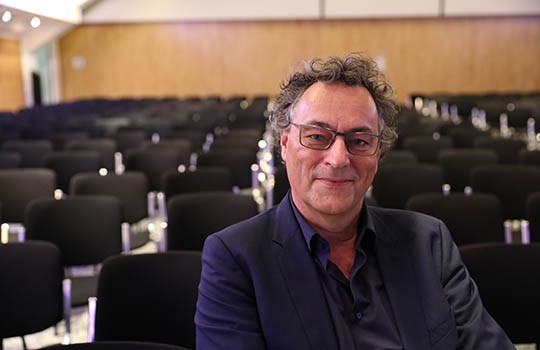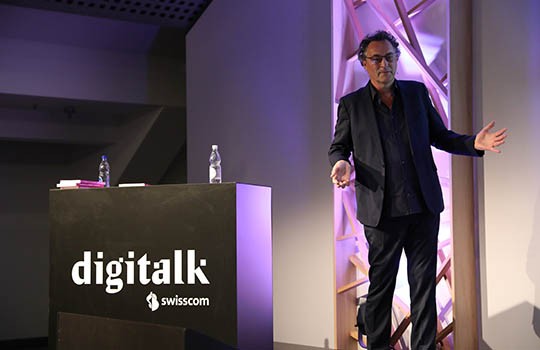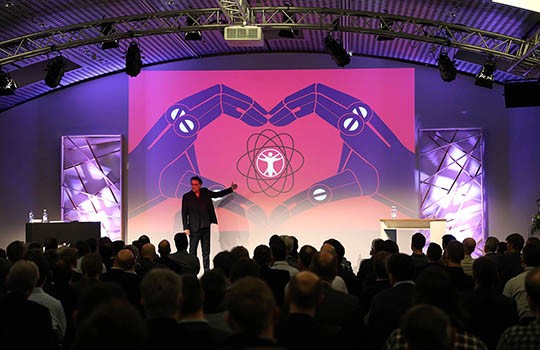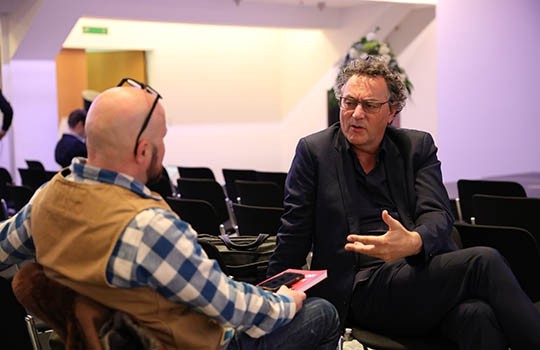Futurist Gerd Leonhard
“We need to dial down the fear”
The future will be better than we think, claims futurist Gerd Leonhard. Ultimately, managing digital transformation is in people’s own hands – however, everyone needs to be clear about what they want to relinquish to technology and what should remain under their own control. An encounter with a man who sees himself as more a future therapist than a prophet.
Text: Flavian Cajacob, Images: Mike Bindemann, 21 march 2019
Ready, set, go! The future starts before the alarm clock goes off. And anyone who isn’t on the ball will oversleep and miss it – the future, which is already mockingly bearing its teeth and relentlessly hissing ‘digital’. No wonder that some people may be feeling a bit queasy about the prospect of life in the slow lane – or, even worse, survival on the hard shoulder.
The issue of fear
Gerd Leonhard is well rested and wide awake. And, professionally at least, is travelling in the fast lane. His opinion on the industrial revolution 4.0, and therefore on digital transformation, is much sought after – by managers, the media, and movers and shakers across the globe. Every day, he analyses how technological achievements will affect our lives.

Futurist Gerd Leonhard
Mr Leonhard, does the future scare you?
‘Not me personally, no. I’m an optimist. But I know, of course, that not everyone is able to share my optimism and that fear of the future is a huge issue out there in the real world. In the last two years, automation and digitalisation have caused many people to think that the future will not be good or will even be terrible!’
Leonhard, who was born in Bonn and later worked in the US as a jazz musician and for internet start-ups, is a futurist and a humanist. He is not a scientist of the calibre of Albert Einstein, as he confirms himself, with a laugh – rather in the league of Jimi Hendrix. A gifted expert in his field, who never forgets the essentials of good entertainment.
Preaching digitalisation
Dressed all in black – shirt, shoes, trousers and jacket – this afternoon, at Swisscom’s invitation, the 58-year-old stands in the World Trade Centre in Zurich Oerlikon and addresses 400 IT industry experts on the subject of the IoT – the Internet of Things.
He strides from the left edge of the stage to the right, then again from the right to the left, as is familiar from keynote speeches by Tim Cook and other tech gurus. He conjures up images and messages on the screen and adds commentary such as: ‘artificial intelligence is a fantastic tool, but a terrible master’, ‘our society will change more in the next 20 years than it has done in the last 300 years’ or ‘we must make a choice between heaven and hell’.

Gerd Leonhard on the stage at Swisscom Digitalk.
Gerd Leonhard, once a student of theology, describes the inevitable and exponential digitalisation. ‘Data is the new oil. Artificial intelligence is the new electricity. And IoT is the new nervous system.’ The son of a forester, who actually says what other people hear, or sometimes would prefer not to hear, is a resolute issuer of warnings. Total transformation is unavoidable, that much is clear. However, technology, or so Leonhard claims, has no other purpose than to bring people happiness.
Mr Leonhard, is digital change a change for the good?
‘Fundamentally, yes. However, the problem with digitalisation is that we often take it too far. For example, if Facebook plans to extend internet connectivity on the African continent by using drones, at first there is no reason to object. But you can be sure that ultimately it will be used more for monitoring people than for connecting remote regions to the internet.
Leonhard is convinced that this kind of unwanted development will destroy the basic positive concept of digitalisation. However, putting all the blame on technology alone would fall short of the mark. He uses a simple example: ‘It’s like having a hammer that you can use to smash nails but also heads at the same time. The hammer doesn’t care what the person uses it for. It makes no choice between good and evil, as then the technology per se would be corrupt.’
Humans do the thinking – and the controlling
If anyone is corrupt, then it is humans. And at this point, Leonhard pinpoints the biggest vulnerability in the development of the digital transformation. As long as our social system is based on financial income as the most significant benchmark for human existence, then people will use and abuse technological achievements for their own purposes. He still sees the idea of an unconditional basic income as a potential basis for a groundbreaking new structure for work and society. Furrows appear on his brow. At one time, many prominent internet companies lived by the principle of ‘don’t be evil’ – today, they are the complete opposite; they are ‘evil’, bad and corrupt. Not because they deliberately wanted to become that way, but simply because there was too much money to be earned from the data.
Mr Leonhard, how often have you personally become ‘evil’?
‘The temptation and the offers, they are out there. Fortunately, I work independently and am in a position to turn requests down. There are companies and organisations that could offer me so much money for my services – but on principle I don’t provide them with my expertise.’
Morality, commitment, meaningfulness – those are the current buzzwords in the world of digital transformation. ‘2019 is the year of digital ethics,’ announces Leonhard from the front of the stage, whilst two robot grippers form the shape of a heart on the screen behind him. It is the cover image from his current book, entitled Technology vs. Humanity – a deliberate provocation, as the speaker confirms. In fact, it’s not a question of playing one off against the other. It is much more about encouraging humans and machines to shake hands. The benefit that humans could gain from technology, in economic, ecological and social terms, is huge. However, what we must understand is the way we want to handle these technological opportunities, today and in the future. ‘We need a fundamental system change, sooner rather than later.’
We need a ‘mission control’
The big question is, what should be taken over by technology and what should remain in human hands? Ultimately, machines and algorithms can relieve us of unpopular work. But who decides where, how and what falls into this category – an algorithm, perhaps? Leonhard agrees in this respect with Kevin Kelly, co-founder of the technology magazine Wired. He introduced a memorable maxim to the world: computers are for answers, whereas humans are for questions.

Leonhard argues the case for an ethics board for digitalisation.
Mr Leonhard, what if machines were to compile your list of questions for themselves one day?
‘Autonomous intelligence is certainly not something desirable. Artificial intelligence basically means us no harm – unless humans program it that way. That’s why we need something like a ‘mission control for humanity’, which will ensure that an equilibrium is maintained between humans and technology. But, who should that be? Who will be an independent force, ensuring data security in the age of intelligent machines? Safeguarding online privacy? At the moment, the control lies in the hands of Silicon Valley. And that cannot be the case. That is the challenge for politicians and large companies.’
In the meantime, here and there, Leonhard can detect a degree of movement in companies towards protecting human interests and ‘humanity’; for example, in the form of newly appointed ‘ethics officers’. They investigate which processes can be automated and the impact on employees and the company – so, they are people who think outside the box. In contrast, Leonhard believes politicians are at a standstill. ‘We would need a European digital ethics council, on which cross-party scientists, philosophers, thinkers and artists would sit. A committee of the wise, so to speak, a council of elders that determines the guidelines for future-orientated action and leads the way for the politicians.’
Humans, focus on your strengths
Over and again during the afternoon’s presentation, Leonhard speaks about the part humans play in the age of technology. Certainly, humans – that means us – are predominantly inefficient, slow and expensive (exactly the opposite of a machine). However, unlike technology, as humans we have innovative strength, creativity, critical thinking and the ability to question things. These skills should be put to use. ‘Efficiency isn’t everything. And humans still have wisdom. Computers can’t be wise, they only project from facts.’ He shows an image on which a target can be seen with lots of arrows that are missing the mark. ‘The machine doesn’t see what accompanies these clearly defined facts; that is much too vague.’
Mr Leonhard, what do you say to the people who think the future will not be good or will even be terrible?
‘For those people who do not engage intensively with technological progress, I suggest they dial down the fear a little. Life will be transformed massively over the next few years. After that, however, there will be a degree of ‘rehumanisation’ – we will become hyper-efficient and completely networked, but we will also have more time for interpersonal, social activities. I say, the future will be a lot better than we can imagine today.’
The machine has facts; the human has wisdom
Fascination, alternated with unease about Leonhard’s predictions, spreads through the auditorium. The theories presented on the huge screen are quickly photographed on smartphones and shared with the outside world. The future that Leonhard outlines in his 45-minute presentation is 90% good. And the remaining 10% not so good.
Mr Leonhard, why should people believe you?
‘Because everything I say, people have actually known for a long time. They just haven’t particularly wanted to engage with it up to now. It’s like if you go to a therapist and they tell you that you’re not treating your wife very well and that your behaviour therefore needs to fundamentally change. You have actually been aware of that for a long time, but only now, when someone raises the issue with you so vividly, do you realise – aha, it really is about time that I actively tackled this.
Final applause. Words of thanks. The darkness in the room gives way to dazzling neon light. Leonhard fumbles to remove his headset, undoes the top button of his shirt and moves between the emptying rows of seats answering questions from enthusiasts and sceptics. Yes, he completely agrees with a study that sees only 5% of all jobs being affected by total automation; no, politics is a long way from a paradigm shift that will lead the way towards a smart future; yes, futurists and journalists will still sit and face each other in the future. Because facts are the one thing that you can also feed machines with.

‘The future will be a lot better than we can imagine.’ Gerd Leonhard in conversation.
‘In the end,’ says Leonhard as he packs his bag, ‘it is not just about projecting these facts; it’s about understanding them. It’s about intuition and non-verbalised information. In its broadest sense, the future is about what has always defined humans – it’s about wisdom.’
Then he glances at the clock. Ready, set, go – gone. The future has caught up with him again. Dinner is already waiting at home.
Video of the entire presentation by Gerd Leonhard
The futurist and Switzerland
Gerd Leonhard has lived in Switzerland for 15 years. His adoptive home is a beautiful island, says the German resident of Zurich. The nature and the security attracted him, but also the ‘code of honour’, which is found in the collective way of thinking and the well-balanced interaction. ‘Admittedly, that is all a bit old-fashioned, but it allows you to have a very good life in the heart of Europe.’
It is against this background that Leonhard sees big challenges facing Switzerland in the next few years. People have stood back from the issue of digital transformation for too long and thought, ‘that’s nothing to do with us, we’ll just sit tight for now’.’ And yet, according to Leonhard, Switzerland has everything it needs to play a leading role – globally recognised universities, smart entrepreneurs, successful start-ups and companies.
The 58-year-old is convinced that Switzerland could establish a single smart city for itself. ‘And Switzerland could be the data repository for the world.’ It is secure, not corrupt and has demonstrated through its banking system in the last 100 years just how to handle a sensitive commodity. ‘People would pay indefinitely if they could store their data in Switzerland and not have to do it in Silicon Valley.’
IoT solutions by Swisscom – concentrated power for all
The Internet of Things, IoT in short, motivates people into action – and ensures that things get moving in all areas of life. IoT applications are massively accelerating innovation cycles for products and services. However, they also raise new questions about security and the handling of the captured data.
As a major driver of technology, Swisscom is aware of this responsibility and supports the responsible management of data, connects and manages ‘Things’ and generates benefits from them. Working together with a broad and diverse partner network and involving the latest technological building blocks, such as Artificial Intelligence (AI), cyber security, analytics and cloud computing, value-generating ecosystems emerge that benefit Switzerland. Specific projects are being developed using simple IoT sensors through to complex networked industrial systems.
More on the topic



